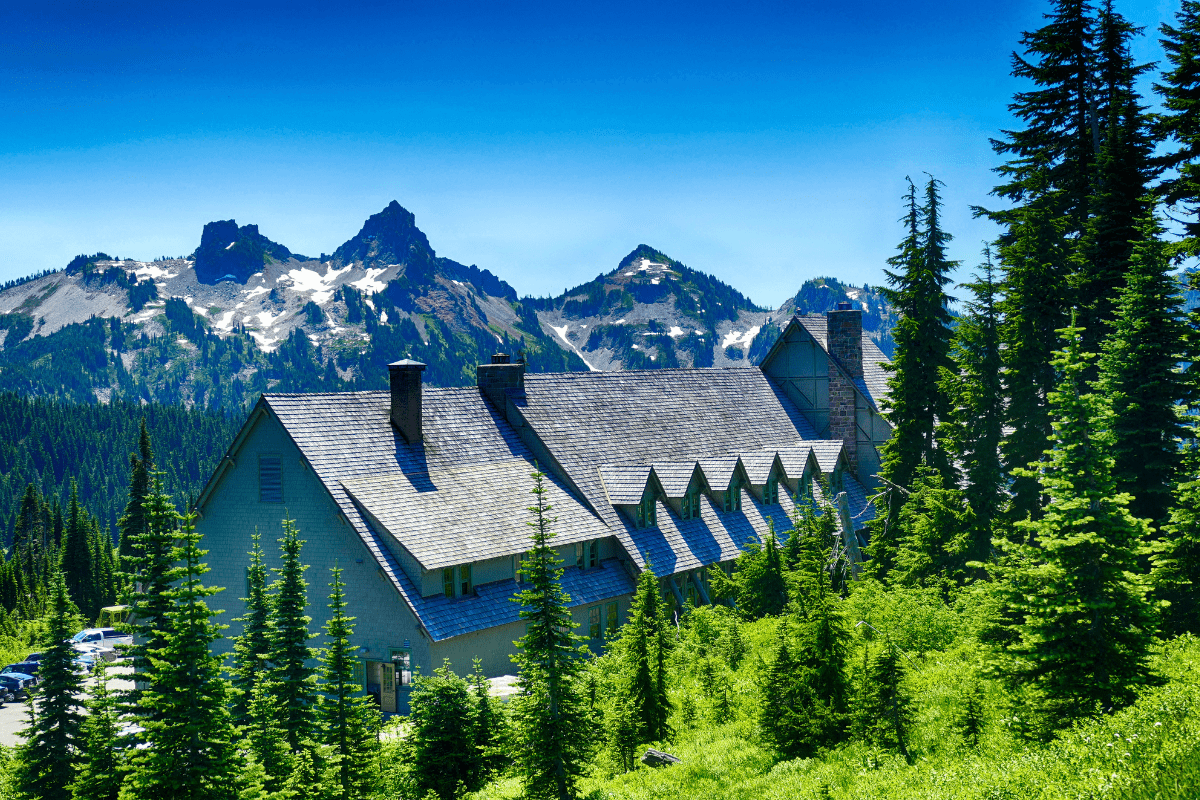Washington state is basically the overachiever of the Pacific Northwest, hosting 17 Fortune 500 companies that collectively generate over $1.3 trillion in annual revenue. From Amazon's world domination plans to Boeing's "let's build really big things that fly" strategy, these corporate giants employ hundreds of thousands while making the rest of us wonder if we should have paid more attention in our computer science classes. If you're job hunting, investing, or just curious about who's really running the show in the Evergreen State, buckle up… we're about to tour Washington's biggest business playground.
The revenue royalty: Washington's financial heavyweights
Let's start with the obvious elephant in the room… or should I say, the Everything Store in the room?
Amazon leads the pack (surprise, surprise)
With $574.8 billion in revenue, Amazon isn't just Washington's biggest company; it's practically its own economy. The Seattle-based giant employs 87,000 people across the state, making it the largest private employer. That's a lot of people working on getting your random 2 AM purchases delivered by tomorrow.
The company's South Lake Union headquarters might get all the attention with its fancy spheres and banana stands, but don't sleep on those 50,000+ workers in fulfillment centers scattered across Washington. From Spokane to Sumner, Amazon's presence is everywhere… kind of like their delivery vans.
The surprising second place winner
Here's where things get interesting. You might think Microsoft would claim the number two spot, but nope! That honor goes to Costco, the Issaquah-based warehouse wonderland that somehow convinced millions of us that buying 48 rolls of toilet paper at once is totally normal. With $249.6 billion in revenue and 304,000 employees globally, Costco proves that bulk buying beats high-tech… at least in the revenue department.
Their recent Q1 2025 earnings showed continued growth, because apparently, we're all still obsessed with $1.50 hot dogs and free samples. God bless America.
Tech titans round out the top five
Microsoft might not beat Costco in revenue ($245 billion), but with a $3.7 trillion market cap, they're not exactly crying into their Surface tablets. The Redmond giant employs around 50,000 people in Washington and just announced an absolutely bonkers $80 billion AI infrastructure investment for 2025. That's billion with a B, folks.
T-Mobile slides into fourth place with $78.6 billion in revenue and 8,000 local employees at their Bellevue headquarters. They added 6.1 million new customers in 2024, proving that magenta really is the new black in telecommunications.
And then there's Boeing, the company that builds flying metal tubes and occasionally makes headlines for… well, let's just say interesting reasons. Despite recent challenges, they still employ 66,792 people in Washington and just scored a $20 billion contract for fighter jets. Not too shabby for a company that started in a red barn.
Breaking it down by industry (because variety is the spice of business life)
Washington's economy isn't just about tech bros and coffee. Let's dive into the different sectors keeping the state's economic engine humming.
Technology: where the nerds inherit the earth
The tech sector in Washington is absolutely massive, with 380,300 direct employees who support a mind-boggling 1.5 million total jobs when you count all the ripple effects. These digital wizards earn an average of $215,600 annually… that's 152% above the state average, which explains why your barista has three roommates.
The big names you know, but here are some other tech players making waves:
- DocuSign ($2.9 billion revenue)
- Zillow Group ($2.0 billion revenue)
- Redfin ($1.0 billion revenue)
- Expedia Group (travel tech giant)
- F5 Networks (keeping the internet running)
- Tableau (data visualization, now part of Salesforce)
The best part? These tech workers generate $4.3 billion in state taxes annually. So next time you complain about that software engineer taking forever to order their oat milk cortado, remember… they're basically funding your roads.
Healthcare: the unsung employment hero
While tech gets all the press, healthcare quietly employs more people than almost any other sector. Providence Health & Services leads the charge with 120,000 total employees, including 40,000 right here in Washington. That's more than some small cities!
The University of Washington deserves special mention. This academic powerhouse generates a staggering $20.9 billion in annual economic impact while supporting 111,951 jobs statewide. UW Medicine alone employs 60,717 people and contributes $12.5 billion to the economy. For every dollar the state invests in UW, it gets back $28.46. That's a better return than most of our 401(k)s.
Retail and consumer goods: because we all need stuff
Beyond Costco's bulk-buying empire, Washington hosts several retail giants:
- Starbucks ($36.2 billion revenue) in Seattle's SoDo district
- Nordstrom ($15.4 billion revenue) keeping us fashionable since 1901
- REI (the co-op that enables our outdoor gear addiction)
- Zumiez (skateboard culture goes corporate)
These companies provide thousands of jobs from entry-level to executive positions. Plus, they ensure we're all properly caffeinated and dressed for whatever Pacific Northwest weather throws at us.
Manufacturing and transportation: building and moving things
PACCAR might not be a household name, but this Bellevue-based company makes Kenworth and Peterbilt trucks and pulls in $32.4 billion annually. Alaska Air Group ($11.7 billion) keeps us connected from their SeaTac headquarters, while Expeditors International ($10.2 billion) moves stuff around the globe from Seattle.
The geography of business: it's not all about Seattle
Sure, Seattle gets all the attention, but Washington's business landscape extends far beyond the Space Needle's shadow.
Eastern Washington: where agriculture meets innovation
Spokane, the state's second-largest city, proves there's economic life east of the Cascades. The state government is actually the largest employer there with 10,000 jobs, followed by Providence Sacred Heart Medical Center (4,000 employees) and yes, even Amazon has a fulfillment center employing 2,000 people.
The Tri-Cities region (Kennewick, Pasco, and Richland) is Washington's fastest-growing metro area. Here's what's driving the boom:
- Pacific Northwest National Laboratory (5,300 researchers doing science things)
- Kadlec Regional Medical Center (3,800 healthcare workers)
- Lamb Weston (3,000 employees making french fries… seriously)
- Tyson Foods (1,400 workers)
Meanwhile, Yakima Valley produces 75% of America's hops, because someone has to keep those Seattle microbreweries supplied. The valley's 2,523 farms generate $2.3 billion annually, with major food processors like Del Monte and Tree Top turning raw agriculture into grocery store staples.
The data center surprise
Here's something cool: Central Washington is becoming a data center hub. Quincy leverages abundant hydroelectric power to attract tech companies looking for server farms. It's like Eastern Washington's revenge… "Oh, you think you're so fancy with your Seattle headquarters? Well, guess where your actual data lives?"
What does it all mean for actual humans?
All these billions sound impressive, but what about real impacts on real people?
The good news
Each tech job in Washington creates four additional jobs through the multiplier effect. That means when Amazon hires a software engineer, it indirectly creates jobs for baristas, dog walkers, real estate agents, and therapists (probably especially therapists).
The numbers are genuinely impressive:
- Tech sector: $99.8 billion in total income
- Aerospace: $19.4 billion in worker income
- Boeing's backlog: 6,156 airplane orders (job security!)
The not-so-good news
Recent developments have been… challenging. The tech industry cut over 50,000 jobs in 2025, with Microsoft laying off 3,120 people in Redmond and Bellevue. T-Mobile cut 400 positions, and Boeing weathered a two-month machinist strike in 2024.
The state also increased its "advanced computing surcharge" from 1.22% to 7.5% for major tech companies. That's government speak for "hey, tech giants, pay up."
Washington ranks pretty poorly in business climate assessments too:
- 42nd for business friendliness (ouch)
- 39th for cost of doing business (double ouch)
- 26% of businesses planning out-of-state expansion (yikes)
Housing costs in Seattle run 45% above the national average, and don't even get me started on the traffic. The average Seattle driver loses 63 hours and $1,128 annually to congestion. That's a lot of podcasts.
Looking ahead: what's next for Washington business?
Despite the challenges, there are reasons for optimism. Microsoft's massive AI investment signals long-term confidence in the region. Boeing's fighter jet contract ensures aerospace jobs for years to come. Eastern Washington continues diversifying beyond agriculture, with 900 wineries now operating statewide (because apparently, we needed more ways to drink).
The emerging data center industry in Central Washington shows the state's ability to leverage natural resources (hydroelectric power) for 21st-century needs. And let's be honest, as long as people need same-day delivery, overpriced coffee, and software to run their lives, Washington's biggest businesses will keep humming along.
The bottom line
Washington's largest businesses create an ecosystem that extends far beyond their shiny headquarters. From Amazon's e-commerce empire to Eastern Washington's potato processors (yes, french fries are serious business), these companies collectively employ hundreds of thousands while generating the tax revenue that keeps the state running.
For job seekers, opportunities abound across industries and geographies. Sure, you might not land that coveted tech job immediately, but healthcare, manufacturing, and even agriculture offer solid careers with less competition.
For investors, Washington's corporate giants offer exposure to everything from cloud computing to bulk toilet paper sales. Diversification at its finest!
And for everyone else? Well, at least now you know who to thank (or blame) for Washington's unique mix of innovation, congestion, and really good coffee. These companies might make us scratch our heads sometimes, but they've transformed a rainy corner of America into a global economic powerhouse. Not bad for a state that most people still associate with grunge music and fish throwing.





